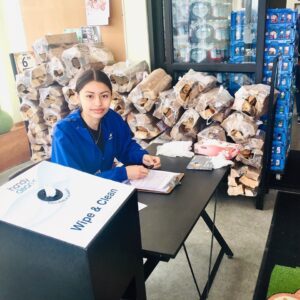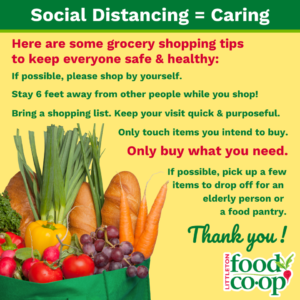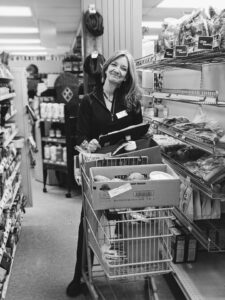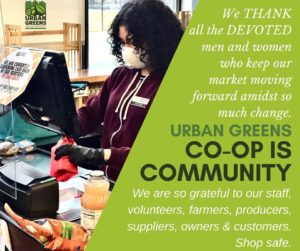
The impacts of Coronavirus, or COVID-19, are likely to be felt for some time. But by working together, we can care for one another and limit its impacts on our communities, local economies, and the food system that we all depend on. Here are a few things our food co-ops want you to know.
Concern for Community is at the heart of the co-operative movement, and your local food co-ops have been working together to address the public health challenges presented by this virus while continuing to provide our communities with safe, healthy food. Because we are community-owned, our priority is serving our members and ensuring that our local economy continues to thrive. You are key to this effort.
- You can help keep our communities healthy.
It is vital that we all work together to slow the spread of COVID-19, and it is worth reminding ourselves that there are some simple things we can do for ourselves and one another:
- Wash your hands with soap frequently,

- Maintain social distancing,
- Cover your mouth with a disposable tissue when you cough or sneeze and throw it away afterward,
- Stay home if you have a fever, cough and difficulty breathing,
- Seek medical attention as soon as you feel symptoms,
- Consult trusted sources of information such as your state department of health and on-line resources such as the Centers for Disease Control and World Health Organization, and
- Reach out if you need support. Maintain remote connections with friends and family, and if you find yourself needing help contact local religious, community, and advocacy organizations that can offer advice and support. Social distancing should not mean social isolation!
- Consult your food co-op’s website for updated hours, policies, and procedures.

Your local food co-op is working hard to adapt to constantly changing conditions and regulations. Their goal is to ensure access to healthy food while protecting your health and the health of their employees. This may include requests to maintain distance from staff, limited hours to allow for increased sanitation, online ordering and curbside delivery, unavailability of prepared foods, and special shopping hours for people at risk. Many co-ops are also looking for volunteers who can help those in need or community organizations.
-
- To find a food co-op near you, visit www.nfca.coop/members.
- Don’t panic and only buy what you need.
While it is important to buy sufficient groceries and supplies for extended periods at home, shortages on the shelves of your local food co-op are related primarily to increased short-term demand. Supply is expected to catch up and in the meantime it is important to make sure that everyone has enough and doesn’t feel more stressed. Please buy what you need and know that your co-op is working hard to keep the shelves stocked and the NFCA is working to keep out local food system humming.
-
- If you are in a position to donate to your local food bank, this is an opportunity to support people impact by the economic slowdown. Many of our co-ops also offer way to donate product, contribute to the cost of membership for people on limited incomes, and support local community organizations.
- Thank your Co-op Staff!

While many of us are doing our part to help prevent the spread of COVID-19 by working from home, many food co-op staff are coming to work every day to keep shelves stocked, run cash registers, pack orders, and keep you and our other community members, fed, safe and healthy. It is a stressful time, and our co-ops are working to make sure they stay safe, feel supported, and have time to rest.
What can you do? Saying “thank you” can make a big difference in someone’s day. You can also respect procedures that put in place, such as maintaining distance, and consider using a credit or debit card to reduce contact. Many co-ops are now taking orders by phone, e-mail, and online for pick-up to reduce contact.
Your co-op’s staff have been working tirelessly and now is a great time to share your appreciation. Give them a thank you or, if you are able, you can also consider buying them a co-op gift card. Co-op staff are on the front lines for us just like our healthcare workers, public safety personnel, and first responders.
-
- Show them some love!
- Support your Co-ops!

Your local food co-op is also a community hub — a place to gather, a source of healthy food, a market for local producers, and a source of sustainable employment — that is also owned by the community. Now is a great time to spread the word about what makes your co-op different and encourage one other person in your community to become a member-owner. Membership in your local co-op helps build a more resilient and sustainable local food system and economy.
You can also…
-
- Show solidarity with other co-ops and their communities by giving to the Cooperative Development Foundation’s Disaster Recovery Fund to help local co-operatives, their members, and their employees weather the impact of COVID-19.
- Support our region’s family farmers and their co-ops impacted by the pandemic by joining the New England Farmers Union and strengthening their voice before policy-makers.
Your local food co-ops are working through their associations and partner organizations to support one another, keep people safe, and advocate for government policies that will sustain our co-operatives and communities moving forward. The NFCA is connecting its member co-ops for mutual assistance and working with partners such as the National Cooperative Business Association (NCBA CLUSA) to help co-ops access information and emergency support top better serve their communities.
- Know that we will get through this, together.
The challenges presented by this pandemic are serious, particularly for those most at risk in our communities, and the impacts of this virus are likely to be felt for months. The stress and anxiety that many of us are feeling is real.
 At the same time, United Nations General Secretary António Guterres has reminded us that “the spread of the virus will peak and our economies will recover. And until then, we must act together to slow the spread of the virus and look after each other.”
At the same time, United Nations General Secretary António Guterres has reminded us that “the spread of the virus will peak and our economies will recover. And until then, we must act together to slow the spread of the virus and look after each other.”
As Mr. Guterres points out, a pandemic such as this reminds us of the essential interconnectedness of our human family and our responsibility for one another. As co-operative businesses, your local food co-ops are built on self-help, solidarity, and mutual aid.
-
- We will get through this time, together. And through co-operation, we will recover and rebuild. Stay healthy and safe, and know that solidarity and caring for one another is key to more resilient, sustainable, and inclusive communities now and into the future.

